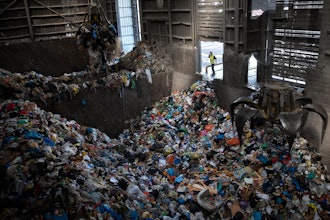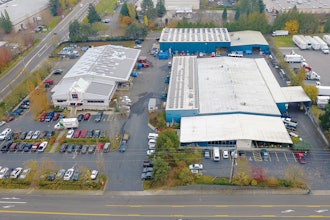PORT WENTWORTH, Ga. (AP) — Volatile dust was blamed Friday in an explosion that leveled a sugar refinery, and crews pulled four bodies from tunnels beneath the mangled mass of metal and beams left by the blast.
At least four people known to be inside during the explosion were missing. Savannah police Sgt. Mike Wilson said no attempts would be made to find more bodies until Saturday, when heavy equipment will be brought in to remove debris.
Search efforts were slowed by the instability of what was left of the refinery, gutted by flames and wracked by the impact of the blast itself.
Anxious families of the night-shift workers at the Imperial Sugar plant gathered at the parish hall of a Catholic church across the street and wept as officials relayed grim news from the plant.
Investigators were unable to determine what sparked the overnight explosion as firefighters battled flames inside the vast refinery — a network of warehouses, silos and buildings eight stories tall connected by corridors of sheet metal.
Imperial President and CEO John Sheptor said sugar dust in a silo where refined sugar was stored before being packaged likely ignited like gunpowder. Sugar dust can become combustible if it's too dry and builds up a static electric charge.
The result was as devastating as a bomb. Floors inside the plant collapsed, flames spread throughout the refinery, metal girders buckled into twisted heaps and shredded sheet metal littered the wreckage.
''There was fire all over the building,'' said Nakishya Hill, a machine operator who escaped from the third floor of the refinery uninjured but for blisters on her elbow.
''All I know is, I heard a loud boom and everything came down,'' Hill said. ''All I could do when I got down was take off running.''
More than 30 employees were rushed to hospitals as ambulances lined up a dozen at a time outside the refinery's sole entrance road.
Several were airlifted to a burn center in Augusta, 130 miles up the Savannah River. Many were in critical condition, including some who were placed on ventilators, said Dr. William Wessinger, the medical director at Memorial University Medical Center in Savannah.
Beth Frits, a spokeswoman for the Joseph M. Still Burn Center at Doctors Hospital in Augusta, said 16 fire victims transferred from Memorial were in critical condition and three were in serious condition.
By Friday afternoon, the first deaths were confirmed as firefighters pulled four bodies from tunnels that ran beneath the refinery. They were not immediately identified.
Many Imperial Sugar employees gathered at the city's gymnasium for a company meeting Friday. Most declined to speak to reporters, saying company executives had asked them not to. The plant has 450 employees, Sheptor said.
Employee Dana Claxton, 28, said the company promised its employees would continue to get paid. But that seemed little comfort to the workers hugging outside the gym knowing some of their colleagues could still be trapped, or dead, inside.
''Everybody is upset about everybody. People haven't made it out of there yet,'' said Claxton, who has worked at the plant for four years. ''There's a million jobs out here, but there's not a million friends.''
The refinery — known here as the Dixie Crystals plant — was one of the largest employers in this tiny city of 5,000 just west of Savannah and a core part of its economy for 90 years.
''I have friends that work at this plant,'' said Port Wentworth Fire Chief Greg Long. ''I know the people that are over there at the church. Basically what went through my mind was hopefully I'll wake up and this will all be a dream.''
Sugar dust is so combustible that static electricity, sparks from metal tools or a cigarette can ignite explosions.
More than 300 dust explosions have killed more than 120 works in grain silos, sugar plants and food processing plants over the past three decades. Most are preventable by removing fine-grain dust as it builds up, experts say.
The U.S. Chemical Safety Board concluded in a special report in 2006 that OSHA had no comprehensive regulation to prevent these explosions and their program ''inadequately addresses dust explosion hazards.''
The board recommended OSHA issue a comprehensive industrial standard for combustible dust.
OSHA did not issue a comprehensive industrial standard for combustible dust, as the board recommended. It did institute a national program under which sites would be inspected for various issues including combustible dust to make sure they complied with federal regulations, OSHA spokesman Mike Wald said.
The Port Wentworth site had not been inspected as part of that new program, Wald said. He said the last OSHA inspection of the facility was in June 2000, in response to an unspecified complaint, with no violations found.
In October 2007, state officials cited the plant for two violations — one involving an opening in a packing room area that could allow pests in, and another for not properly protecting buckets used for packing molasses in a warehouse.
The U.S. Chemical Safety Board said it was sending an investigative team to the plant.
The Port Wentworth refinery turns raw cane sugar into crystal sugar sold in supermarkets. The plant opened in 1917 under the ownership of French Cajun transplants from Louisiana. Fire officials said original tongue-and-groove woodwork and other materials from its earliest construction helped feed the blaze that engulfed the plant.
''The city's probably here because of the sugar refinery,'' said the Rev. Michael Kavanaugh, parish priest of the Our Lady Of Lourdes Church across the street from the plant. ''It would probably be the most important thing here.''
Imperial Sugar markets some of the country's leading sugar brands, including Imperial and Dixie Crystals, and supplies sugar and sweetener products to industrial food manufacturers.
Imperial, based in Sugar Land, Texas, acquired Savannah Foods & Industries, the producer of Dixie Crystals, in 1997. It became largest processor and refiner of sugar in the U.S., according to the company's Web site.
Associated Press Writers Bruce Smith in Savannah and Harry Weber in Atlanta contributed to this story.






















